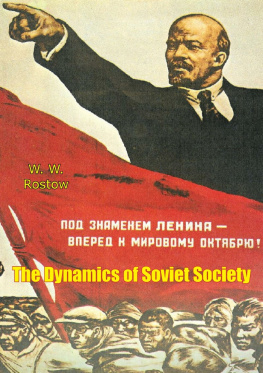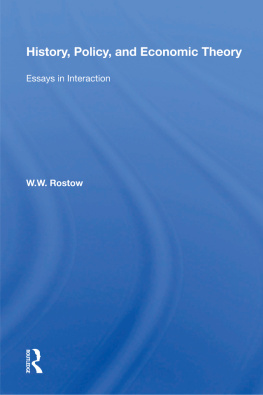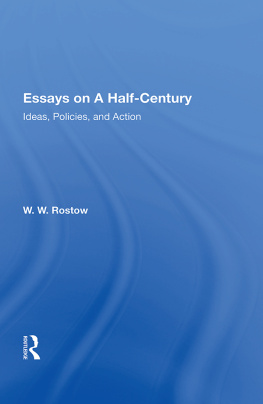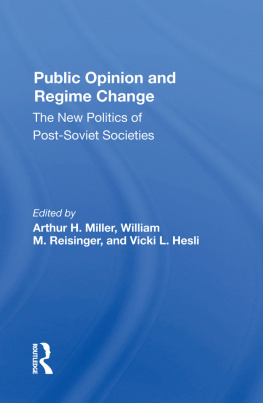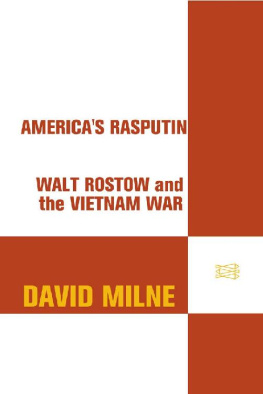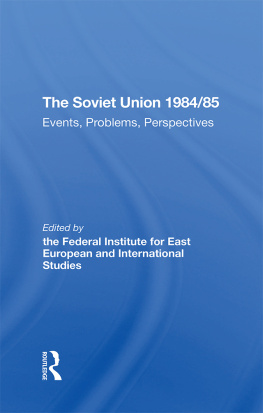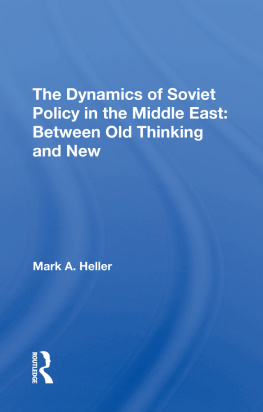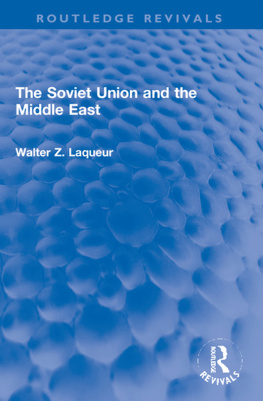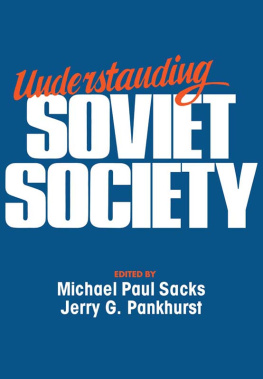Barakaldo Books 2020, all rights reserved. No part of this publication may be reproduced, stored in a retrieval system or transmitted by any means, electrical, mechanical or otherwise without the written permission of the copyright holder.
Publishers Note
Although in most cases we have retained the Authors original spelling and grammar to authentically reproduce the work of the Author and the original intent of such material, some additional notes and clarifications have been added for the modern readers benefit.
We have also made every effort to include all maps and illustrations of the original edition the limitations of formatting do not allow of including larger maps, we will upload as many of these maps as possible.
THE DYNAMICS OF SOVIET SOCIETY
BY
W. W. ROSTOW
THE DYNAMICS OF SOVIET SOCIETY
An authoritative, up-to-date interpretation of Soviet rule from its origins to the present day, prepared by W. W. Rostow and a group of outstanding political analysts from the Center for International Studies, Massachusetts Institute of Technology.
The Enigma of a Totalitarian State
What determines the policy of the Soviet state at home and abroad? What are the prospects for change in Soviet Society?
These are two of the vastly important questions examined in this excellent and absorbing study of the history of the Soviet rule and analysis of all its current activities.
The Center for International Studies of the Massachusetts Institute of Technology commissioned Mr. Rostow to write this volume, in collaboration with others, in order to bring to the general public an intelligent synthesis of the facts now known about Russia.
This lucid and illuminating book covers the evolution of Soviet rule, the higher politics, the bureaucratization, ideology, foreign relations, and the development of satellite states. It also describes the pattern of Soviet society in general, the instability of its executive organization, the causes of group dissatisfactions.
Few studies of the Soviet scene are so provocative of thought or so demand rethinking of traditional interpretations. N.Y. Times
A solid and serious work. San Francisco Chronicle
Prefatory Note
THIS book is one result of a series of investigations carried out at the Center for International Studies of the Massachusetts Institute of Technology. The Center is dedicated to an attempt to bring to bear the resources of the academic community on problems of action confronting the United States in its relations with the rest of the world. Perhaps the most important of those problems is how we are to conduct ourselves with respect to Soviet Russia.
In considering whether to launch the studies of which this book is the first product we asked ourselves what use the government operator or the voter behind him might make of the work of the academic fraternity. The field of Soviet scholarship has proved exceedingly fruitful over recent years. Despite the iron curtain, a large body of information and insights has been accumulating in scholarly monographs and journal articles. What kind of distillation of this growing fund of knowledge would be of most help to the harried official who must plot daily moves in the chess game and to the worried citizen who must decide whether to support or oppose the general national strategy?
One answer we got when we asked this question was, Facts, give us facts. Every added scrap of information helps. This suggested the preparation of an encyclopedia conveniently indexed and cross-referenced. But the suspicion grew as we worked that no amount of facts would really help those whom we thought of as our customers. The questions which were keeping men awake nights in Washington were exactly those which trouble us all: What will the Kremlin do next? Why did they take this step or that step? What makes these people tick, anyhow? And what kinds of changes in the Soviet system may conceivably come about which could abate the cold war? No simple compilation of facts would be much help to people struggling with these imponderables. We concluded that just because facts on the Soviet Union were hard to come by, the illusory impression had grown that if only you could get more information the whole exasperating puzzle would be somehow solved. That this was an illusion was suggested by our difficulties in understanding other societies that are completely open to our questions.
We finally concluded that what was most urgently needed was not new information but a way of making sense out of what was already known. Could a set of ideas be provided, an interpretive framework, which would give the non-expert the feeling that he understood some degree what was going on, and what might go on in the Soviet Bloc?
The experts, whether academic or governmental did not of course need this. Each has developed his own conceptual picture of why the Soviets are as they are. Nobody can devote his life to why the Soviets are as they are. Nobody can devote his life to the study of a society without developing a set of hypotheses as to the prime motivating forces within it. The question was whether there had developed sufficient consensus among close students of Russian society so that it might be possible to present, for the non-expert, a picture with which, in the main most of them would agree.
The Center asked Mr. Rostow to attempt such a synthesis with the assistance of a number of specialists to help him with particular aspects of the problem. Starting as a non-specialist, he read voraciously and consulted endlessly with everyone he could find who had knowledge, scholarly or direct, of contemporary Russia. He finally emerged with the conviction that there was a common pattern sufficiently clear to justify his trying to draw it for the benefit of others.
The responsibility for an interpretive job of this kind must ultimately fall upon a single mind. This is essentially Mr. Rostows book. There will be many who will say they would have used different language or placed their emphasis differently. There will no doubt be some who will go so far as to say that the whole interpretation is wrong from beginning to end. But the Center has been gratified that, in spite of every scholars compulsive necessity to be original and to disagree with his colleagues, so many of them have accepted this analysis as a useful approximation.
One of the most valuable characteristics of this analysis is that it attempts to portray the Soviet system not as something static and unchanging but in a recognizable process of historical evolution. This emphasis upon change and the forces that brine it about may mislead some readers as to the objectives of the book. The temptation to seek in its pages a daily explanation of the news in the morning paper will be strong. In one sense it is appropriate that the thesis of the book should be tested against current events. The forces analyzed by Mr. Rostow are powerful ones which will not alter their direction abruptly. If the analysis is valid, new developments should be at least partly explainable in terms of those forces.
It was for this reason that Chapter 15 was added. The other chapters of the book were completed prior to Stalins death. The author felt that this event was likely to be of such critical importance in Soviet history that some discussion of its implications should be added.
Since Chapter 15 was completed there have been a number of other notable incidents which invite comment. We have witnessed the disorders in Eastern Germany beginning on June 17, the dramatic downfall of Lavrenti Beria, the purging of numbers of his henchmen and supporters, especially in Georgia, the Soviet agreement to meet with the Western powers on German unity and other problems, and the major speech of Premier Malenkov (which lies before me in the morning paper as I write this) announcing Soviet possession of the hydrogen bomb andperhaps even more significantsuggesting a serious intention to shift resources to a heavier emphasis on consumer goods. Undoubtedly by the time this book appears in print there will have been many other events calling for interpretation.

